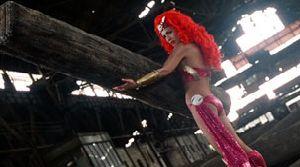
Zsa Zsa Zaturnnah Ze Moveeh (Joel Lamangan, 2006)
Carlo Vergara's graphic novel Zsa Zsa Zaturnnah details the adventures of a timid gay man who transforms into a Wonderwoman-type superhero every time he swallows a rock that landed on his head. It is a significant addition to Philippine pop literature: a superhero who clearly represents the plights and fantasies of the local gay community. Not long after the graphic novel's publication, a musicale on Vergara's creation was staged, which became a hit, not only among the gay community but among mainstream theater patrons. Regal Entertainment took an interest on the material and bought the rights to produce a film based on the musicale in time for the lucrative Metro Manila Film Festival. Mark Meily (director of charming features Crying Ladies (2003) and semi-musicale La Visa Loca (2005)) was supposed to helm the project but left because of creative and budgetary issues. Joel Lamangan (who is also no stranger to musicales or gay films, having directed Pusong Mamon (Soft Hearts, 1998) and awful musicale-comedy I Will Survive (2004)) took charge.
Philippine cinema is perhaps one of the oldest that had openly homosexual main characters (although initially these characters portrayed the stereotypical crossdressers, usually for comic relief (with Dolphy, Roderick Paulate or Joey de Leon's comic creations)). A common stereotype on Philippine cinema is that veers towards homosexual issues (especially after Lino Brocka's Macho Dancer (1988), Mel Chionglo's shallow reproductions of Brocka's film, Lamangan's own gay-themed dramas, the utterly lovable Ang Pagdadalaga ni Maximo Oliveros (The Blossoming of Maximo Oliveros, Auraeus Solito, 2005)). However, Zsa Zsa Zaturnnah Ze Moveeh offers something fresh: it is significantly jovial, blunt in its political incorrectness, and just utterly unmindful of the harsh realism that usually pervades queer cinema. Of course, those are basically the imprints of the source material and the subsequent musicale which Lamangan borrowed heavily from, using most of composer Vince de Jesus' songs.
The budget is obviously meager. The special effects are not polished. The production design is at times haphazardly done. The chorus of the initial song is awfully recorded which turns De Jesus' song into a muddled and incomprehensible mess. Lamangan is clearly opting for camp and it shows. It is refreshing to see Lamangan direct with lightheartedness. The material being a stage musical, it certainly feels that Lamangan is right at home (he used to direct theater before delving into film). Most of the musical numbers are bright and fun, choreographed with cheesy dance numbers (the initial number is reminiscent of Jacques Demy's The Young Girls of Rochefort (1968) wherein dainty citizens of a French port town suddenly erupt into old-Broadway style song-and-dance numbers; only in Lamangan's case, the numbers happen in an obviously made-up shanty town); and sung with the most heartfelt histrionics. Vince de Jesus is clearly no Sondheim as there is a lack of biting or groundbreaking melodics to his work. The lyrics aren't all that either. However, they serve their purpose, which is to entertain.
Zsa Zsa Zaturnnah Ze Moveeh is of course made for mainstream audiences. With that, it doesn't have much to say in addition to what was already written by Vergara. Compare this to something similar made by Thai auteur Apichatpong Weerasethakul. In Weerasethakul's The Adventures of Iron Pussy (2003), a transvestite agent (think James Bond wearing make-up and dresses) fights, sings, and adventures his way towards his true love, a rich man who, if I remember correctly, turns out to be a close relative. Within the construct of a ridiculously conceived plot line, Weerasethakul has said a lot of things with regards to unpopular issues such as homosexuality, incest, and other dividing topics. However, the bitter pill is swallowed with delightful ease because the film dons a diverting garb. Openly gay Lamangan has no politics to forward (now at least, I thought he has turned into a mere employee of Regal Entertainment rather than an artist). He crafts something out of Vergara's rich material and whatever survives from Vergara's politics is clearly a mere by-product of the unimaginative director who is more interested in keeping deadlines than making art. I would've loved to see how a straight director (Meily) handle the film, but that is now an impossibility. All we have now is this, a movie that certainly entertains but delivers no real memorable punch.
0 comments:
Post a Comment